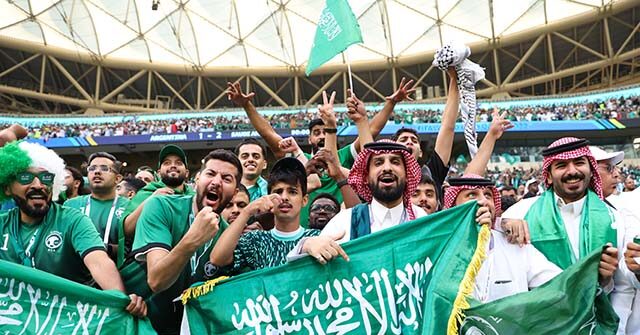

The Fédération Internationale de Football Association (FIFA) confirmed on Tuesday that the kingdom of Saudi Arabia would host the 2034 World Cup, outraging human rights activists who decried “sportswashing” by the country to improve its reputation despite abuse of its citizens.
Saudi Arabia was reportedly the only country to bid on hosting the 2034 men’s tournament as a result of FIFA requesting that Asia and Oceania countries volunteer to host that tournament. While some reports indicated that Australia, which recently hosted the FIFA Women’s World Cup, would compete with Saudi Arabia, the country confirmed this week that it would not be seeking to host the tournament.
According to the Saudi news outlet al-Arabiya, the deadline for new hosting bids passed on October 31, leaving Saudi Arabia the only option.
“The next two editions of the FIFA World Cup are set to be hosted in Africa (Morocco) and Europe (Portugal and Spain) – with three celebratory matches played in South America (Argentina, Paraguay and Uruguay) – in 2030 and in Asia (Saudi Arabia) in 2034,” FIFA President Gianni Infantino announced on Tuesday. “Three editions, five continents and ten countries involved in staging matches in the tournament – that’s making football truly global!”
“The bidding processes were approved by consensus via the FIFA Council – where all six confederations are represented – after constructive dialogue and extensive consultation,” Infantino’s announcement continued, declaring that the next few iterations of the tournament, including the planned event in Saudi Arabia, would be “the perfect showcase for a message of unity and inclusion.”
Saudi Arabia would be the second Middle Eastern country, after Qatar, to hold the tournament. The 2022 Qatar World Cup prompted international outrage as Qatar – an Islamist theocracy, like Saudi Arabia – maintains a poor record of human rights abuses against women, non-Muslim religious groups, and gay and lesbian people, among other marginalized groups. The facilities used for the Qatar World Cup were built largely through slavery; Qatari officials largely denied abuses against workers for years while the facilities were being constructed, but admitted during the 2022 World Cup that at least 500 people died in deplorable conditions while preparing the tournament.
Saudi Arabia similarly represses non-Muslim religions, exploits migrant workers, and prescribes death for anyone found legally guilty of “homosexuality.”
“It is a clear-cut, unadulterated example of sports washing,” Jules Boykoff, a professor specializing in the intersection of politics and sport at Pacific University, Oregon, told Time this week about Saudi Arabia’s World Cup hosting bid. “It’s stoking nationalism at home, deflecting attention from human rights problems and trying to garner national prestige.”
Shortly before Infantino’s confirmation of the Saudi Arabia hosting responsibilities, Human Rights Watch condemned FIFA for even entertaining the possibility.
“With Saudi Arabia’s estimated 13.4 million migrant workers, inadequate labor and heat protections and no unions, no independent human rights monitors, and no press freedom, there is every reason to fear for the lives of those who would build and service stadiums, transit, hotels, and other hosting infrastructure in Saudi Arabia,” Human Rights Watch director of global initiatives Minky Worden said, according to ESPN.
“The possibility that FIFA could award Saudi Arabia the 2034 World Cup despite its appalling human rights record and closed door to any monitoring exposes FIFA’s commitments to human rights as a sham,” Worden added.
FIFA stood by Qatar despite years of condemnation over human rights issues – in addition to accusations of discrimination against Israelis, mysterious journalist deaths, and claims of severe human rights abuses by Qatari police immediately before and during the tournament. During the 2022 “Pride Month” to celebrate LGBTQAI2+ people, FIFA claimed the Qatar World Cup would be a “celebration of unity and diversity.”
Saudi Arabia was also among the most vocal supporters of the Qatari World Cup bid. Crown Prince Mohammed bin Salman, the nation’s de facto ruler, made a point of attending games alongside Qatari Emir Sheikh Tamim bin Hamad, cheering for each other’s teams and conspicuously embracing.
HRH Crown Prince Mohammed bin Salman during his attendance at the opening ceremony of the #FIFAWorldCup 2022 tournament, at the invitation of H.H the Emir of the State of #Qatar at Al Bayt Stadium in the Qatari capital Doha. pic.twitter.com/JBs64X1Lfd
— Foreign Ministry 🇸 (@KSAmofaEN) November 20, 2022
Watch: #Qatar’s Emir Sheikh Tamim bin Hamad is seen carrying #SaudiArabia’s flag and draping it around his neck during the Kingdom’s match against Argentina at the FIFA #WorldCup.https://t.co/G450866hTh pic.twitter.com/YB0Pj08uJS
— Al Arabiya English (@AlArabiya_Eng) November 22, 2022
Bin Salman has made turning Saudi Arabia into a sports powerhouse a cornerstone of his “Vision 2030” plan to diversify the economy away from oil and turn the country into an influential world power. Saudi Arabia’s LIV golf league scored a major win for the country in June by merging with the American PGA, guaranteeing top-level players would have to play in a partially Saudi-owned league.
The Saudi government has also been elbowing itself into F1 racing, club soccer, and multisport tournaments such as the Asian Games. Confronted about “sportswashing” – or using sports to improve the unpopular image of his country, Bin Salman said in an interview in September, “If sport washing is going to increase my GDP by way of 1%, then I will continue doing sport washing.”





